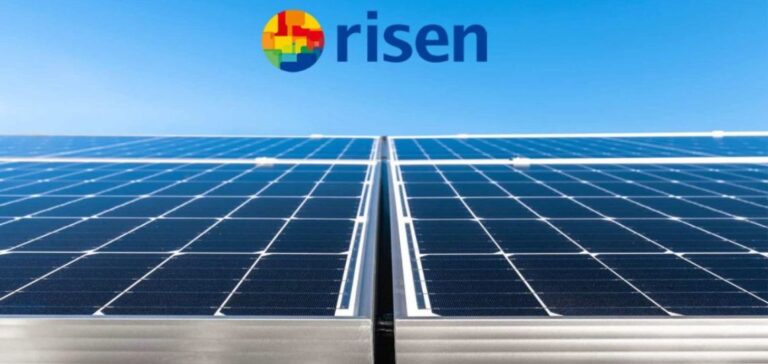Risen Energy, one of the world’s leading manufacturers of high-performance solar photovoltaic (PV) products, has announced that the Hyper-ion heterojunction (HJT) solar module produced by the Nanbin 15GW manufacturing base (Phase-1) has been withdrawn from the assembly line.
Sustainability and Innovation: Risen Energy raises the bar with HJT Modules
The moment was celebrated at a ceremony attended by Risen Energy executives and government representatives. Together, they witnessed the milestone that will greatly strengthen the company’s plan. Aimed at increasing the production capacity of the Hyper-ion series. The announcement comes at a time when Risen Energy has pledged to concentrate on the research and development of n-type HJT modules. Within the framework of the company’s mission and strategy. Aimed at catalyzing innovation in high-power, high-efficiency solar modules.
Risen Energy is the latest solar leader to consider HJT technology as one of its key innovations. They will usher in a new era for the solar industry. By boosting energy production while reducing the cost and carbon footprint of solar products. Earlier this year, Risen Energy unveiled plans to increase the production capacity of its n-type HJT Hyper-ion series to 15 GW by the end of 2023. Risen Energy’s HJT Hyper-ion modules are equipped with a wide range of cutting-edge features at the forefront of solar technology. Outperforming their market peers in terms of performance and profitability.
Their state-of-the-art efficiency is achieved through the use of low-temperature double-sided passivated contacts and double-sided microcrystalline technology. Thus with a maximum output power of 741,456Wp and an efficiency exceeding 23.89%. Risen Energy’s Hyper-ion HJT modules offer a stable temperature coefficient, capable of maintaining their output power above 90% even after 30 years of use.
Risen Energy: Meeting Global Demand for Sustainable Energy Solutions
What’s more, the carbon footprint value (CFP) of the modules is less than 400 kg eq CO2/kWp. Located in the south of Ningbo, with a total investment of 15.2 billion RMB. Risen Energy’s Nanbin manufacturing base covers an area of 1448 mu (238 acres).
This is a major project that reinforces our new energy ambition. This has enabled Ningbo to establish a hundred-billion-dollar industrial ecosystem specializing in R&D. And the production of solar photovoltaic cells, glass, modules and energy storage systems. Ninghai, a county under the administration of Ningbo, has set out to become a solar hub. Ninghai saw the combined industrial output of the photovoltaic and energy storage sectors reach 6.65 billion RMB in 2023 Q1 alone. This represents an increase of 78.8% over the same period last year.
Congratulating on the milestone moment of the manufacturing base, Ge Renyuan, deputy mayor of Ninghai County, said, “Risen Energy’s leadership in PV R&D and manufacturing has greatly contributed to the growth of the industry, and the inauguration of Risen Energy’s Nanbin manufacturing plant is essential to the expansion of Ninghai’s renewable energy landscape. We are committed to fostering a business-friendly environment, creating a space where new energy companies can explore innovation and drive transformative change that helps China and beyond accelerate the energy transition while improving people’s living standards.”
“The formal operation of the Nanbin manufacturing base not only gives Risen Energy another competitive advantage, but is also of crucial importance in feeding Ninghai’s resources to develop smart manufacturing. Looking ahead, Risen Energy remains steadfast in its mission to bring a paradigm shift to the solar industry with technological breakthroughs, enabling the global economy to build a green and sustainable future for all. We will focus on intensifying the production of high-efficiency modules as we continue to strengthen the solar value chain in Nanhai to achieve greater industry synergy, helping the region establish itself as a photovoltaic and energy storage powerhouse,said Wu Xuegang, President and Board Member of Risen Energy.
Risen Energy is about to expand its production capacity for high-efficiency HJT modules. The company strives to meet global market demand for clean, sustainable energy solutions. Guided by its mission to enable a new green energy for a better life. Aisni Risen Energy remains dedicated to pioneering technological advances that bring about significant change for mankind.






















